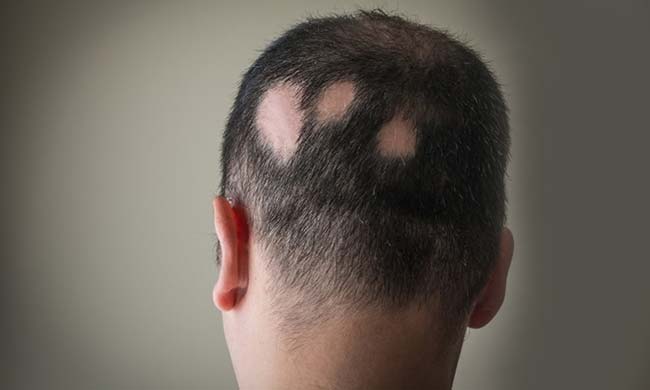Alopecia areata is an autoimmune condition that causes hair loss in patches on the scalp and other areas of the body. It occurs when the immune system mistakenly attacks hair follicles, leading to hair loss and sometimes baldness. At our dermatologist’s office, we specialize in the diagnosis and management of alopecia areata, offering compassionate care and effective treatment options to help patients regain confidence and restore hair growth.
Causes and Triggers: The exact cause of alopecia areata is not fully understood, but it is believed to involve a combination of genetic, environmental, and immunological factors. Stress, illness, hormonal changes, and certain medications may trigger or exacerbate the condition. Individuals with a family history of autoimmune diseases such as thyroid disorders, rheumatoid arthritis, or type 1 diabetes may be at increased risk of developing alopecia areata.
Symptoms: Alopecia areata typically presents as one or more round or oval patches of hair loss on the scalp or other areas of the body. In some cases, the hair loss may progress to total scalp hair loss (alopecia totalis) or complete body hair loss (alopecia universalis). The affected skin may appear normal or may be slightly red, inflamed, or itchy. Hair loss may occur suddenly and without warning, leading to feelings of distress and anxiety.
Treatment Options: While there is no cure for alopecia areata, various treatment options can help manage symptoms and promote hair regrowth. These may include:
- Topical Treatments: Corticosteroid creams, ointments, or solutions applied directly to the affected areas can help reduce inflammation and stimulate hair follicles.
- Intralesional Corticosteroid Injections: Injecting corticosteroids directly into the affected areas can help suppress the immune response and promote hair regrowth.
- Topical Immunotherapy: This treatment involves applying a sensitizing agent to the scalp to provoke an allergic reaction, stimulating the immune system to target and destroy faulty immune cells attacking the hair follicles.
- Systemic Medications: Oral medications such as corticosteroids, immunosuppressants, or biologics may be prescribed for severe or widespread cases of alopecia areata.
- Hair Transplant Surgery: In cases of persistent or extensive hair loss, hair transplant surgery may be considered to transplant healthy hair follicles from donor areas to the affected areas of the scalp.
Living with Alopecia Areata: Living with alopecia areata can be challenging, but with the right treatment and support, many individuals can achieve significant hair regrowth and lead fulfilling lives. Our dermatologist’s office is dedicated to providing compassionate care and personalized treatment plans tailored to each patient’s unique needs and concerns. Contact Forever Yooung Clinic today to schedule a consultation and take the first step toward managing your alopecia areata and restoring your hair and confidence.


